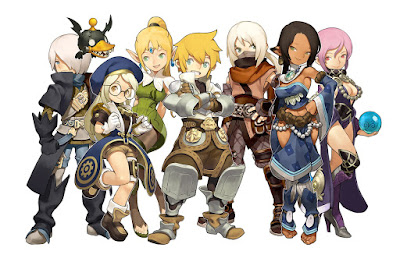 |
| Character Art - Dragon Nest, Eyedentity Games |
Topple over your opponents as you climb your way to the finish line.
 |
| Warrior - Dragon Saga, Gravity |
Theme: The game's events take place in the future, where human intelligence has increased to the point where magic and other superhuman powers are no longer latent. Tools have been created to increase the potency of these powers and these are used in the media for entertainment, similar to programs like Ninja Warrior.
This game, however, is simply a race between classes (Warrior, Mage, Archer, etc.) to see who can brave the elements, and each other, to reach the end of the global race track. The winner receives immense fame and glory to bring home along with a lifetime supply of hot wings.
The game's art will be inspired by the concept art styles of Dragon Nest and Dragon Saga, giving the game a very cheery feel.
 |
| The Game's Color Palette |
* Update - October 3, 2016
A friend of mine, Nick Dahill, gave me an idea that I believed was pretty great during our Game Design Club a few days ago. Instead of having defined classes for the players, allow the players to switch off at certain points to what the classes would have been.
"Do I want to become an ice mage now so I can benefit from that area later or do I want to stay a fire mage for this area now?"
I've incorporated this mechanic into the game which I believe has added the depth within the game I know it needed in the field of strategy. I've incorporated the several regions of the game onto a prototype board: Arctic (Ice Powers), Volcanic (Fire Powers), Mountainous (Superhuman athleticism) and the Jungle (Floral Powers). Each of these regions have their own spaces that the players will be able to use to slow their enemies down in an attempt to catch up or get ahead.
I believe this also allows for the feeling of progression and choice, allowing players to either keep certain powers throughout the entire game or change powers at every single region, if they so choose. I want to design the board in such a way that switching off powers at every region is the best thing to do, but rather players can keep or change off powers at given points regardless of the region and still become victorious. However, there will also be a mechanic involved that prevents players from switching to a skill set that was received in a past shop. For example, if a player wishes to use the Arctic skill set, the very first skill set that the players will obtain (subject to change), they must keep it until they find that they can use something that will benefit them more. Once they switch from it, they can not go back.
* Update - October 11, 2016
Final iteration on the names of the regions: Fire, Ice, Earth, and Forest.
I've been told that having only one of four of each type of Skill Card available at only one region each made the skill cards almost completely ineffective. A suggestion, again from Nick Dahill and Alex Charnes was that I should incorporate more use of the skill cards into the game, which made sense because I want the gameplay to be contingent on these skill cards and how the players use them.
I've practically littered the board with all the different kinds of hit zones and players can now visit the Dealer's Dock to obtain their cards from what is no the facedown pile of Skill Cards. There are still Four Regions on the board and each region has two of each element. That region's respective hit zone (i.e. Ice Region with the Ice Hit Zone) has an extra space, giving a total of 9 hit zones across each region.
There are also benefits to casting a Skill Card in that card's region (i.e. casting the Ice Skill Card in the Ice Region, Earth Skill Card in the Earth Region, etc.). These benefits essentially make their respective skill cards stronger, allowing players to either wait to reach that region or barrage their opponents, which will hopefully make the game more fun to play.
 Being stranded in outer space seems like a terrifying predicament to be in, especially when you must survive out there on your own. The telling of Mark's story and how he was able to survive out on space alone is both impressive, yet jarring.
Being stranded in outer space seems like a terrifying predicament to be in, especially when you must survive out there on your own. The telling of Mark's story and how he was able to survive out on space alone is both impressive, yet jarring.




